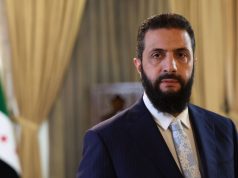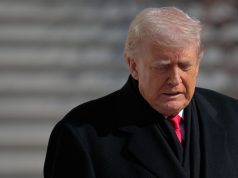
Venezuelan pro-democracy campaigner María Corina Machado has won the 2025 Nobel Peace Prize.
Despite an unprecedented – and public – campaign for the accolade by Donald Trump, the Norway-based prize committee chose Machado, in recognition of her “tireless work promoting democratic rights for the people of Venezuela”.
Who is María Corina Machado?
Now living in hiding and blocked from running for office, Machado is Venezuela’s main opposition leader and has, over two decades of resistance to authoritarianism, “hiked overpasses, walked highways, ridden motorcycles, sought shelter in supporters’ homes” and “seen her closest collaborators detained and persecuted”, said The Associated Press.
Born in Caracas in 1967, she studied engineering and finance and spent a short time working in business before, in 1992, establishing a charity to help street children. A decade later, she co-founded Súmate, an organisation that promotes free and fair elections, and carries out training and election monitoring.
In 2010, she was elected to Venezuela’s National Assembly but was expelled four years later after being accused of plotting to overthrow President Nicolás Maduro – charges the International Foundation for Electoral Systems called “unfounded”. She hoped to run for president in 2024 but was banned from doing so by Venezuela’s Supreme Court. Her subsequent support for Edmundo González Urrutia was widely believed to have won him the vote but Maduro declared victory for himself.
Since Maduro’s widely condemned re-election, Machado “has barely felt the sun on her skin”, said Elle in a profile published last month. She has made only a few, brief public appearances, and her three adult children live outside the country, along with her mother, sisters and ex-husband, due to the threats to their safety posed by the Maduro regime.
Who chooses the Nobel Peace Prize winner?
The Norwegian Nobel Committee chooses the winner of the Peace Prize and the five committee members are elected by Norway’s parliament, the Storting. Each member is elected for a six-year term, and can be re-elected.
Nobel rules mean committee members must “represent the strength of the different political parties in Norway’s parliament, but cannot be sitting members of the parliament”, said Al Jazeera.
The director of the Norwegian Nobel Institute acts as committee secretary, while the members themselves pick their chair and deputy chair.
This committee then accepts submissions for nominations for the award from “qualified nominators”, who include members of national governments, heads of state, and members of the International Court of Justice in The Hague. Other nominators include officials with international peace organisations, and university professors of history, social sciences, law, philosophy and religion. Former recipients can also submit nominations – but nobody can nominate themselves.
The committee says the large number of potential nominators ensures a “great variety of candidates”, although the lack of clear criteria for a successful nomination means “the process has sometimes been taken advantage of, for nakedly political reasons”, said The New York Times. Joseph Stalin and Benito Mussolini were both nominated twice.
How do they decide on a winner?
This year, there were 338 nominations for the Nobel Peace Prize by the January deadline and, in March, the committee prepared a shortlist.
On Monday, the committee convened beneath a portrait of founder Alfred Nobel to share “coffee and pleasantries”, said the BBC, which this year, for the first time, was allowed a “behind-the-scenes glimpse of the process”. Proceedings always begin with a “reading of the criteria for the prize enshrined in Nobel’s will from 1895”, before debate gets underway behind closed doors.
“We discuss, we argue; there is a high temperature,” committee chair Jorgen Watne Frydnes told the broadcaster. “But also, of course, we are civilised, and we try to make a consensus-based decision every year.”
Have there been controversial winners?
The Nobel Peace Prize is “rarely awarded to the most humble, modest or compassionate nominee”, said political communications lecturer Colin Alexander on The Conversation. “Instead, it all-too often ends up in the hands of high-profile figures who want it.”
The institution “might want to claim it is fully independent and works on the principle of group consensus” but “the reality is that its decision is often a political one”.
One of the “most controversial decisions” was to award the 1973 prize to Henry Kissinger, then-US secretary of state. He had been “instrumental” in withdrawing of US troops from Vietnam but his background “advocating for the proliferation of nuclear weapons” means the committee’s decision “still divides opinion today”.
Along with Mussolini’s and Stalin’s nominations, Adolf Hitler was once nominated for the prize – albeit satirically by an anti-fascist Swedish lawmaker in 1939. None of them won – and in the year that Hitler was nominated, the prize wasn’t awarded at all. Meanwhile, Mahatma Gandhi was nominated five times but never won – an omission that is often remarked upon.
Why didn’t Donald Trump win?
This year, the selection process took place with Trump looming large over the whole affair. The US president made no secret of his ambition to win the prize and has repeatedly reeled off a list of the seven wars he says he has solved, claiming that “everyone says I should get it”.
He has “piled intense pressure” on the committee, said The Telegraph, even raising the issue in a phone call with Norway’s minister of finance. But insiders said the president “does not align with the ideals of the Nobel Peace Prize and his divisive leadership style will harm his quest for the award”. His “military posturing, US Aid cuts and worldwide tariffs conflict with the spirit of international harmony” that Nobel sought to promote.
Trump’s public campaigning was “very strange”, Henrik Syse, who previously sat on the prize committee, told the paper. But Kristian Berg Harpviken, secretary of the committee, said Trump’s overtures would not impact the process. The procedure is “set up to insulate the actual deliberations” from possible outside influences, he said.
Asle Toje, one of the sitting judges, warned that such campaigns are received poorly. “Some candidates push for it really hard,” he said, “and we do not like it.”
Activist María Corina Machado wins prestigious prize, despite public campaign by Donald Trump




